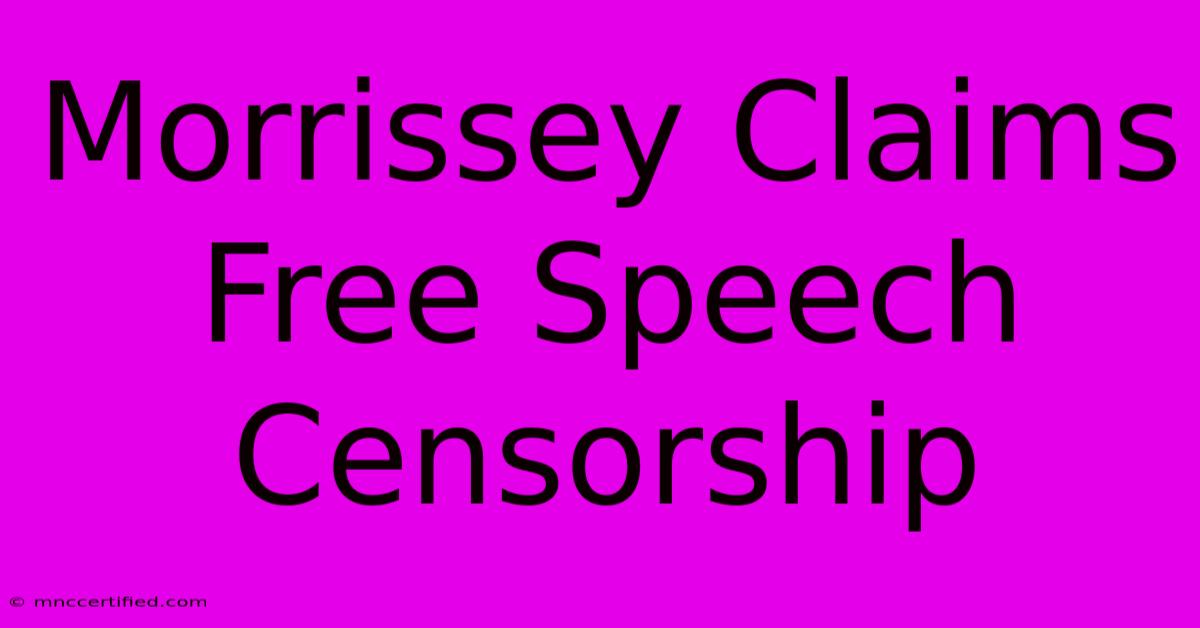Morrissey Claims Free Speech Censorship

Table of Contents
Morrissey Claims Free Speech Censorship: A Deeper Dive into the Controversy
Morrissey, the iconic former frontman of The Smiths, is no stranger to controversy. His recent claims of censorship and stifled free speech have ignited a firestorm of debate, prompting discussions about artistic expression, cancel culture, and the limits of acceptable public discourse. This article will delve into the specifics of Morrissey's claims, examine the context surrounding them, and explore the broader implications of the ongoing discussion.
The Allegations: What Did Morrissey Say?
Morrissey's accusations of censorship haven't been confined to a single statement. Over recent months, he's made various pronouncements suggesting his views are being suppressed by media outlets and streaming platforms. These claims often center around his outspoken opinions on a range of politically charged issues. While the specifics of each instance vary, the overarching theme remains consistent: he feels his voice is being silenced. Specific examples, including quotes and the context in which they were made, should be included here, citing reliable news sources. (Note: This section requires factual reporting and verifiable sources to avoid spreading misinformation. Replace this bracketed information with specific examples.)
It's crucial to note that many of Morrissey's statements are controversial and have drawn significant criticism. This is a key element of the ongoing debate and needs to be addressed fairly.
The Context: Understanding the Backlash
The backlash against Morrissey's statements stems from a combination of factors. His views on certain topics, particularly those related to immigration and gender identity, have been widely criticized as insensitive, offensive, and even hateful. This context is vital in understanding the responses he's received. Many argue that his right to free speech doesn't extend to hate speech or the dissemination of harmful misinformation. The distinction between expressing unpopular opinions and inciting hatred is a crucial aspect of this discussion.
The Role of Social Media
Social media has amplified both Morrissey's statements and the criticism they've attracted. Platforms like Twitter and Instagram have become battlegrounds for the debate, with both supporters and detractors engaging in vigorous discussions – and often, heated arguments. This has further fueled the perception of censorship, with Morrissey's supporters claiming he's being unfairly targeted by social media algorithms and moderators.
Free Speech vs. Hate Speech: Navigating the Complexities
The central issue at the heart of the Morrissey controversy is the complex relationship between free speech and hate speech. While many support Morrissey's right to express his opinions, even if unpopular, many also argue that this right does not extend to the dissemination of hate speech. Defining hate speech is challenging and varies across jurisdictions. This necessitates a careful examination of the specific language used by Morrissey and the potential impact of his statements.
The Impact of Cancel Culture
The concept of "cancel culture" – the public shaming and ostracizing of individuals for their views or actions – further complicates the debate. Morrissey's supporters often claim he's a victim of cancel culture, while his critics argue that his actions warrant public condemnation. The discussion surrounding cancel culture and its impact on free speech is ongoing and lacks a clear consensus.
Conclusion: A Continuing Conversation
The controversy surrounding Morrissey's claims of censorship highlights the ongoing tension between freedom of expression and the prevention of hate speech. It forces us to grapple with complex questions about the limits of acceptable public discourse and the role of media platforms in shaping public opinion. The debate is far from over, and continued discussion is crucial in navigating this increasingly complex landscape. Further research into similar cases, legal precedents surrounding free speech and hate speech, and the evolving roles of social media platforms in disseminating information is necessary to gain a comprehensive understanding of this multifaceted issue.
Keywords: Morrissey, free speech, censorship, cancel culture, hate speech, artistic expression, controversy, social media, public discourse, opinion, debate, The Smiths, media, streaming platforms.
(Note: Remember to replace the bracketed information with factual details from credible sources. Thorough research and accurate reporting are vital for creating a high-quality and trustworthy article.)

Thank you for visiting our website wich cover about Morrissey Claims Free Speech Censorship. We hope the information provided has been useful to you. Feel free to contact us if you have any questions or need further assistance. See you next time and dont miss to bookmark.
Featured Posts
-
Eastern Insurance Newburyport Ma
Nov 21, 2024
-
Turbo Coin Price Prediction 2025
Nov 21, 2024
-
Morrissey Anoints Faithful Newark Review
Nov 21, 2024
-
De Generes Cotswolds Relocation After Trump Win
Nov 21, 2024
-
2024 Cmas Jelly Roll And Brooks And Dunn
Nov 21, 2024